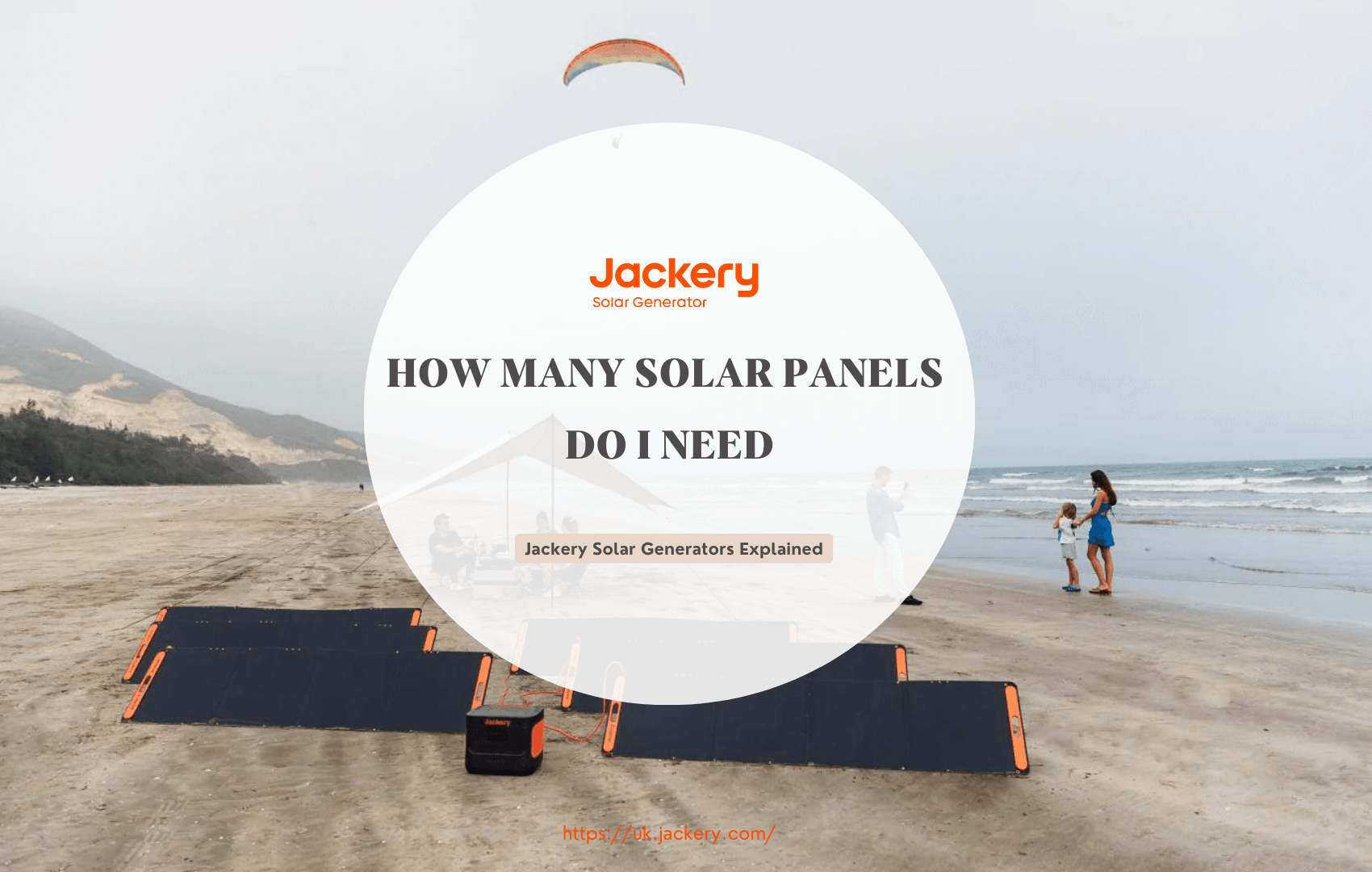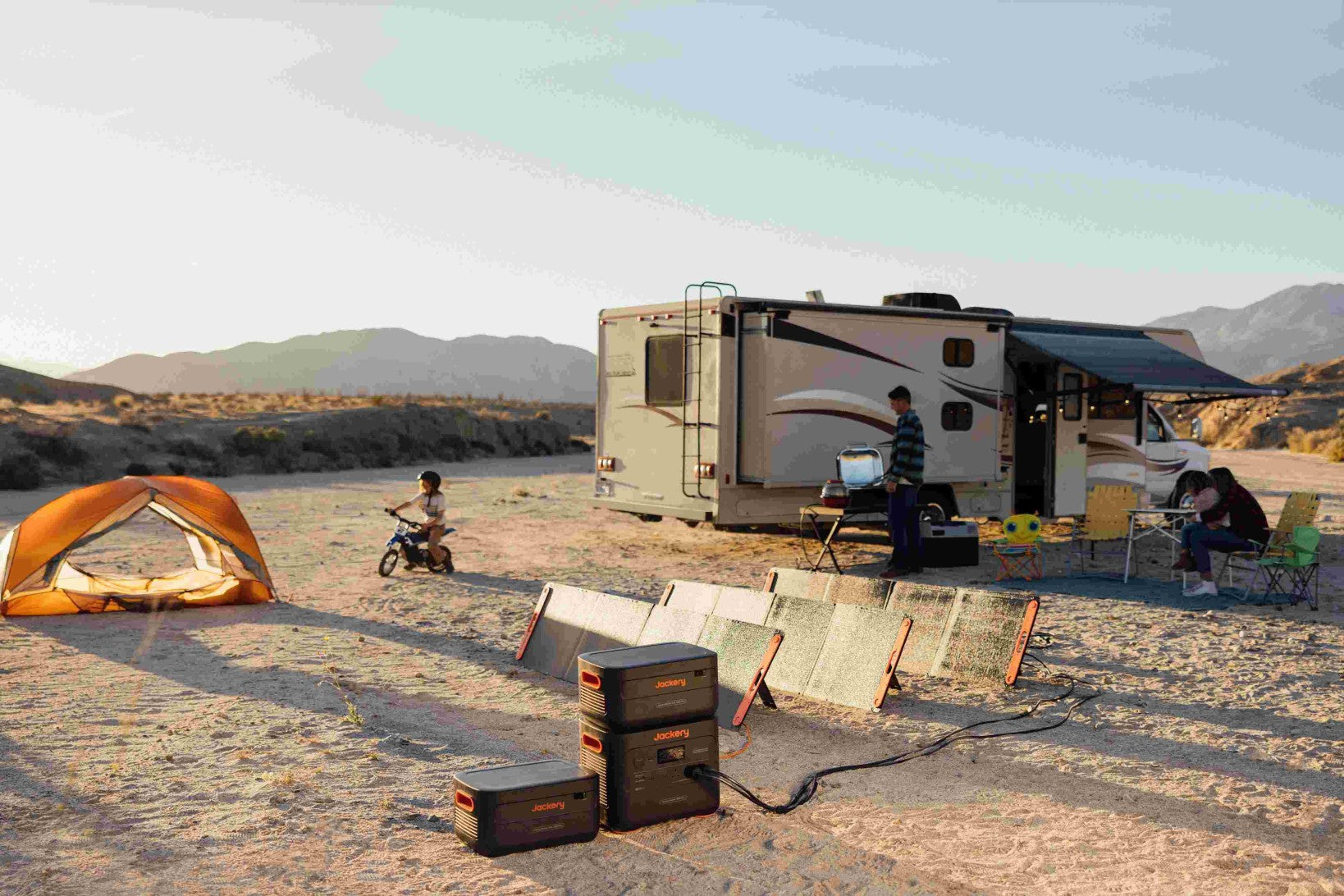Solar power is a great way to power your home, lower your bills, and reduce your reliance on the grid. You may have some pressing questions before purchasing solar panels.
For example, many people may wonder, "How many solar panels do I need to power my house?" Of course, there is no one-size-fits-all answer. The number of solar panels you need depends on annual electricity usage, solar panel size, and roof space.
This guide will answer this question in detail. Besides, we highly recommend Jackery Solar Generator, a portable solar power solution, to charge your appliances and save on electricity bills with solar energy.
|
Key Takeaways: |
|
- The number of solar panels required for different homes in the UK also varies. - More specifically, in the UK, a one or two-bedroom home would require around 5 to 8 solar panels (if the panels are rated at 350W) or 4 to 6 solar panels (if the panels are rated at 450W). - On average, a two or 3-bedroom home will need 10 to 13 panels of 350W solar panels or 8 to 10 panels of 450W solar panels. - Three simple steps can help you estimate the number of solar panels you need. - We highly recommend Jackery Solar Generator 2000 Plus and 1000 v2 to save your electric bills with solar energy. |
Typical Number of Solar Panels in The UK
When considering going solar, the most pressing question is, "How many solar panels do I need?" The number of solar panels required for different homes in the UK varies. Personal electricity needs, the amount of sunlight the area receives, and the available space on the roof are all critical factors in determining the number of solar panels.
Depending on its electricity usage, a UK home might consider anything from a small 2kW system to a more extensive 6kW system. Therefore, a typical tiny home might require around 4 to 8 solar panels, while a more prominent home might require up to 16 solar panels.
More specifically, in the UK, a one or two-bedroom home would require around 5 to 8 solar panels (if the panels are rated at 350W) or 4 to 6 solar panels (if the panels are rated at 450W). If the house is more significant, such as a two or 3-bedroom home, the number of solar panels required will increase accordingly.
On average, a two or 3-bedroom home will need 10 to 13 panels of 350W solar panels or 8 to 10 panels of 450W solar panels. Similarly, for a larger home with 4 to 5 bedrooms, 16 panels of 350W solar panels and 13 450W solar panels will be needed.
Typical number of solar panels for a UK home:
|
Home Size |
Solar System Size |
Solar Panel (350W) |
Solar Panel (450W) |
|
1-2 bedrooms |
2-3kW |
5-8 |
4-6 |
|
2-3 bedrooms |
4-5kW |
10-13 |
8-10 |
|
4-5 bedrooms |
6kW |
16 |
13 |
Remember that the above estimates for the number of solar panels are based on average conditions, and actual needs may differ depending on the amount of sunshine in your location, the efficiency of your solar panels, and your home's consumption.
Of course, not all UK homes that use solar power rely entirely on the output of their solar panel systems. Many UK homes want to reduce their electricity use from the grid to a certain extent and reduce their electricity bills accordingly. In other words, they are not replacing the grid with solar power but sharing their electricity consumption and bills. Therefore, they may install a small number of solar panels.
How Many Solar Panels Do I Need in The UK?
How do you calculate how many solar panels you need? First, you need to estimate the size of the solar system you need. In other words, you should first know your electricity consumption. Secondly, you need to confirm the roof space and the size of the solar panels.

Step 1: Calculate Your Electricity Usage
Firstly, you need to determine how much electricity you use each year. Fortunately, you can find out how much electricity you use by looking at your electricity bill from last year. In addition, if you have not received a bill for the past 12 months, contact your electricity supplier to find out your total annual electricity consumption in kilowatt-hours (kWh).
According to Ofgem, the average UK household uses about 2,700 kWh of electricity annually. You can then divide the average annual electricity consumption by 365 to get your daily electricity consumption.
2700 kWh / 365 = 7.4 kWh/day
Therefore, your solar panel system must generate about 7.4 kWh of electricity daily to meet your needs.
Step 2: Determine The Power of Your Solar Panel
The second step in calculating how many solar panels you need is determining the proper power solar panels.
In the UK, a typical solar panel (350W) produces an average of 265 kWh of electricity annually. Therefore, you divide your annual electricity usage by 265, and you will get a rough estimate of the number of solar panels that will fit your home. Using the data from step 1 as an example, the following steps will give you an estimate of the number of solar panels you will need:
2700 kWh / 265 kWh = 10.19
So, if your annual electricity usage is 2700 kWh, you will need 11 350W solar panels. A rule of thumb in the UK is that every 1 kW of solar panels installed on your roof will generate about 760 kWh of electricity.
Divide your annual electricity usage by the number of solar panels per kW to get the appropriate solar panel system size. Next, you divide your solar panel system size by 1000 to convert it to watts. Finally, divide by the power required by the solar panels to get the corresponding number of solar panels. Then, taking the data in step 1 as an example, the estimated number of solar panels required can be calculated.
|
Example of Calculating Solar Panels Needed |
|
If you choose a 350 W solar panel, you will need 11 panels. 2700 kWh / 760 kWh * 1000 / 350W = 10.15 You will need eight panels if you choose a 350 W solar panel. 2700 kWh / 760 kWh * 1000 / 450W = 7.89 |
Step 3: Determine Your Roof Area
Finally, it would help if you determined whether the area for installing solar panels is sufficient. Taking the roof area as an example, please check in advance or hire a professional to measure your roof to see if the required number of solar panels can be installed.
You need to divide the area of your roof by the area of the solar panels to determine the number of solar panels you need. Generally speaking, the size of solar panels used in the UK is 1.6 to 2 square meters.
|
Solar Panel Output (W) |
Typical Solar Panel Dimensions |
|
350 |
1.6m x 1m |
|
400 |
1.67m x 1m |
|
450 |
1.9m x 1m |
For example, if your roof area is 12m x 8m = 96 square meters, the number of solar panels can be calculated according to the following steps:
96 square meters / 1.6 square meters = 60
96 square meters / 2 square meters = 48
Therefore, if your roof area is 96 square meters, you can install 48 to 60 solar panels.
Based on the above, you don't have to worry about your roof area being too small because you can use panels with higher power ratings to reduce the roof area. Alternatively, consider installing solar panels on land, such as in the garden.
Finally, remember to roughly deduct the area of chimneys, vents, skylights, etc., when estimating the roof area.
Factors Affect The Number of Solar Panels
In addition to electricity usage and the size of the solar panels, other factors affect how many solar panels you need. Well other factors that affect the number of solar panels required include:

Sunshine Hours
The property's location determines the number of sunshine hours you will receive and the electricity the solar panels generate. Even though the UK is relatively small globally, there are surprising differences in the amount of sunshine received by different parts of the country.
In the UK, sunshine hours vary from region to region, affecting solar energy production. England averages about 4.1 hours of sunshine, Scotland about 3.7 hours, Northern Ireland about 3.2 hours, and Wales about 3.3 hours. More southern parts of the UK receive more solar radiation than northern parts.
In southern England, for example, a system of 10 350-watt (W) solar panels can produce about 2,978 kilowatt-hours (kWh) of electricity per year. In northern Scotland, the same solar panel system generates 2,221 kWh of electricity annually.
Roof Orientation & Pitch
The orientation and pitch of the roof also affect the performance of solar panels. In the UK, roofs that face south and tilt slightly to the west receive the most sunlight. Although the situation varies somewhat across the UK, this rule generally applies throughout the UK.
According to relevant departments, solar panels on roofs facing east or west produce 20% to 30% less electricity than on south-facing roofs.
The best solar panel tilt angle in the UK is 30° to 45°, and it is recommended to adjust the angle throughout the year to adapt to the sun's changing position. Around 35° is the angle at which solar panels achieve the best results. Therefore, the closer the roof tilt is to 35°, the better the effect.
Roof Load Capacity
In addition to the solar panel's physical size, you should consider its weight. The standard weight of residential solar panels in the UK is 18-21 kg, including the frame's weight and mounting equipment.
|
Solar Panel Output (W) |
Typical Weight Per Panel |
|
350 |
18kg |
|
400 |
18kg |
|
450 |
21.6kg |
Then, for most modern roofs with a load capacity of 140kg per square meter, there is no problem. Of course, this assumes that it is a standard roof. In conclusion, a professional solar panel installer should assess all roof structures to check their strength and solidity.
Shading & Obstructions
Obstructions prevent sunlight from reaching the roof, making solar panels less efficient. Therefore, please consider any obstructions affecting the solar panel's performance. Relevant obstructions may be chimneys, nearby buildings or trees, or shadows falling on the roof.
Jackery Solar Generators Explained
After knowing how many solar panels you will need for your home, there is an alternative to charge your appliances with solar energy - a solar generator. Solar generators can be backup, emergency and quiet generators for indoor and outdoor uses, especially the Jackery Solar Generator.

Jackery Solar Generators are comprised of SolarSaga Solar Panels for solar energy capture and Explorer Portable Power Stations for energy storage for further utilisation. The generator can power multiple appliances, such as refrigerators, TVs, lights, etc. Here, we recommend Jackery Solar Generator 2000 Plus and 1000 v2.
Jackery Solar Generator 2000 Plus
Jackery has introduced the Solar Generator 2000 Plus, a solid portable power solution that delivers outstanding performance. With its impressive capacity and powerful output, this device can support the operation of typical appliances for weeks, which is best for camping, off-grid living, power outages, emergencies, and more.

- Expandable Powerhouse for Your Appliances: The Jackery Solar Generator 2000 Plus enables the addition of extra battery packs, increasing the capacity from 2 kWhto an impressive 12 kWh, thereby significantly improving the solar charging capabilities. This solar product has a remarkable output of 3000W, providing a 30% higher rated power than other 2 kWh solar products. Almost all necessary household appliances are powered.
- Higher Resistance & Reliability: The Explorer 2000 Plus stands out as a groundbreaking add-on battery pack that offers the convenience of recharging through solar panels. This feature increases versatility, boosts charging efficiency, and shortens charging time.
- Safe to Use with ChargeShield: ChargeShield is Jackery's advanced fast charge technology, featuring 62protective mechanisms, 12 protective algorithms, and four types of physical safety protection. This technology uses a unique stepped variable-speed charging algorithm to enhance safety and extend battery pack lifespan by 50%.
|
*Review from Our User |
|
I have been a long-time user of Jackery batteries. I experienced a wonderful thrill with the launch of the Explorer 2000 Plus. This is the first release of a disposable battery system from Jackery. The system offers a capacity of up to 12kWh with a 3000W 120V output or 24kWh with a 6000W 240V output, making it a perfect upgrade for my home backup system. |
Jackery Solar Generator 1000 v2
Jackery Solar Generator 1000 v2 is the smallest and lightest 1 kWh solar generator for emergencies, which pairs the Explorer 1000 v2 portable power station with SolarSaga 100W solar panels. Compared to Solar Generator 2000 Plus, it is more suitable for charging your RV, off-grid tiny house, or campervan appliances.

- Charging Several Appliances in Emergencies: The Explorer 1000 v2 portable power station provides a phenomenal 1500W output, 50% more than prior editions, to efficiently run high-demand needs, including refrigerators, ovens, portable air conditioners, etc. With USB-A/C connections and up to 100W dual PD charging, it can charge several devices (phone, laptop) concurrently, therefore serving as the best friend for all your power requirements.
- Multiple Recharging Options: The Emergency Charge Mode lets the Explorer 1000 v2 Portable Power Station be wholly charged in less than an hour, providing vital power backup when your battery runs low. If you want to recharge it, it will take 5 hoursfor wall charging or 12 hours for the car charging. Besides, a SolarSaga 100W solar panel will take 15 hours to recharge fully.
- Higher Solar Conversion Rate: The Jackery SolarSaga 100W Solar Panel boasts a solar conversion rate of up to 25%; it is optimally designed for outdoor use and unforeseen power interruptions. The solar panel weighs about 8 lbs, is lightweight, foldable, and equipped with a convenient carry handle, enhancing its portability.
|
*Review from Our User |
|
The Jackery Explorer 1000 v2 bundle with a 100W solar panel is nicely priced in the UK and can be found directly from Jackery. I think Jackery totally nailed it with the new upgraded V2 version of their Explorer model! It's like the perfect combo of power and weight! So impressed! |
Solar Panels Installation & Maintenance Tips
Like any other home improvement, correct installation and proper maintenance are essential to get the most out of your solar panels.
Solar Panel Installation
To get the most out of your solar panels, they must be installed correctly. Before the actual installation begins, the roof should be checked for suitability. If there are any structural deficiencies, they should be addressed before adding the weight of the solar system.
Finding a good and reliable solar panel installer is crucial, so look for MCS-certified installers. Of course, you can also choose to install your solar panels yourself. Here are the steps to install a solar panel:
Step 1: Build Scaffolding
Step 2: Install Solar Panel Brackets
Step 3: Install Solar Panels
Step 4: Connect Solar Panels
Step 5: Install Solar Inverter
Step 6: Connect Solar Inverter to Battery System
Solar Panel Maintenance
Having clean, well-maintained solar panels will help them perform at their best. By regularly checking your system and keeping a record of maintenance checks and system performance, you'll be able to detect any potential problems early and fix them promptly. Paying attention to common solar panel issues and fixing them promptly can keep them in top condition for years.
Dirty Panels: Solar panels can often get dirty from dust, pollen, bird droppings, or other debris. To remove any traces of dirt, wipe them with soapy water.
Failed Components: If you notice a drop in power output, it could be that the inverter is faulty or another component has aged. If the inverter or other critical component fails, it can affect system performance. So check regularly and promptly repair or replace the inverter or other essential elements to ensure your solar panel system runs smoothly. It would help to monitor whether your battery storage is depleting faster than usual.
Loose Mounts: Loose mounts can put your solar panel system at risk. So, perform regular maintenance checks and contact a professional installer if any loose mount needs repair.
As a rule, solar panels should be cleaned twice to four times yearly. Remember, seeking professional help is essential. Professional cleaners can complete cleaning and repair tasks safely and efficiently.

Solar Panel Incentives in The UK
Despite the incredible benefits of solar power, there are inevitably some costs associated with it. However, there are also financial incentives you can take advantage of to reduce costs. The UK government offers several grants for solar panels to promote energy-efficient upgrades and renewable energy and help reduce carbon emissions.
Overall, there are currently four notable solar incentives for solar panels in the UK.
|
UK Solar Grants |
Eligibility |
Run Time |
Potential Savings |
|
0% VAT |
All UK buyers |
April 1st 2022 - March 2027 |
£2,850 (4kW solar panels + battery) |
|
Energy Company Obligation 4 (ECO4) |
Low-income households |
April 1st 2022 - March 2026 |
Partially or fully FREE solar panel possibility |
|
Smart Export Guarantee (SEG) |
Any solar panel owner |
January 1st 2020 - (indefinite) |
Additional £45 to £80 (£520 to £1,360 total energy savings) |
|
Warm Homes Nest Scheme |
Homeowners in Wales |
Indefinite |
FREE solar panel possibility |
(Data Source: Greenmatch)
While there are no grants in the traditional sense in the UK, opportunities for solar panel financing do exist. Even though some government initiatives are free grants for solar panels, others are loans or VAT relief, which count as government schemes for solar panels.
While there are some requirements to meet for the solar panel incentives mentioned above, they are generally extensive and have helped many people switch to solar.
With the government-run Green Homes Grant, Smart Export Guarantee (SEG) and Energy Company Obligation Scheme (ECO4), you may be eligible for a grant or loan that can significantly reduce your initial costs. The Smart Export Guarantee (SEG) only accepts new applications.
FAQs
The following are the frequently asked questions about how many solar panels do I need in the UK:
- How many solar panels do you need to be self-sufficient in the UK?
The number of solar panels you need to be self-sufficient in the UK will generally depend on several factors, such as the size of your home. However, most 3-bedroom homes can be self-sufficient with a 4kW system. Therefore, consult a solar expert in advance to provide tailored advice for your specific situation.
- Do solar panels work well in cold weather conditions?
Solar panels should still work in the winter. Generally, they will still work fine if there is sunlight and perform better in colder temperatures. However, it should be noted that solar panels may produce less electricity due to shorter days and less sunlight than in the summer when the daylight hours are longer.
- Is there a limit to the number of solar panels you can install?
Generally, there is no hard limit on the number of solar panels installed in the UK. However, many limiting factors exist, such as roof space (the area on the roof that can be used to install solar panels), planning permission (extensive systems or specific areas may require permission), and budget.
- Do solar panels last long?
Solar panels can last about 25-30 years. Of course, high-quality panels can last up to 50 years, but they are more expensive. In any case, remember that regular maintenance can maximise the lifespan of your solar panels.
Final Thoughts
The growing global emphasis on sustainable energy has led to a surge in interest in and adoption of solar panels. As technology improves, more homeowners find harnessing the sun's power financially viable.
This article will guide you through estimating the number of solar panels you need for your house or outdoor activities in the UK and the factors that affect the number of solar panels. Besides, if you think installing a solar panel system is challenging, we introduce Jackery Solar Generator without professional installation and maintenance.


































































































